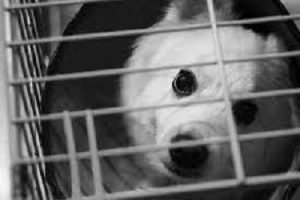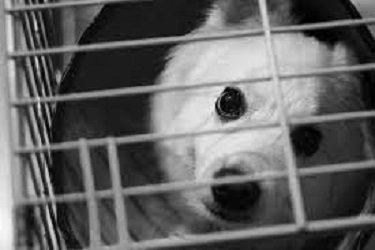Dogs like to chew random objects and it is completely normal for them. However, sometimes dogs start chewing metal crates due to many reasons. The latter is a red flag and it needs immediate treatment.
So, if your dog is chewing its metal crate then stop it before this behavior becomes a habit. The latter gets harder to resolve. You don’t have to worry as today we will share how to stop dogs from chewing on a metal crate. However, firstly it is important for you to understand why your dog chews its metal crate?
Let’s find out the answer.

Why do dogs chew their metal crates?
Learning why your dog is chewing its metal crate will help you to deal with this problem. Furthermore, there are various reasons behind kennel chewing in dogs. Some of the most prevalent ones are as follows:
- Dogs tend to chew more when they are bored
- Dogs who chew kennels are suffering from anxiety
- Dogs that spend more time in cages chew metal crates more often
- Puppies are most likely to bite cages when they are teething
These are the main causes why your dog does kennel biting. Let’s discuss the above-mentioned causes in detail to understand your dog problem deeply.
Does boredom in dogs cause kennel biting?
When you left your dog alone in its kennel, it gets devoid of physical interaction or stimulation such as cuddling, playing games, or having a meal. In this situation, your dog wants to do something to get out of its boredom. And the latter trigger your dog to kennel biting. However, cage chewing is more common in pet dogs than in shelter dogs or puppy mills.
Does anxiety in dogs provoke cage chewing?
When your dog feels unsafe in any surrounding, it triggers their anxiety. Especially, when dogs move out of their old home. The latter increases the stress levels in dogs. That’s why to distract their mind from anxious feelings, dogs like to chew their cages.
Does long-term caging cause kennel chewing?
When you put your dog in its kennel for a long time, the dog assumes this as punishment. Furthermore, spending more time in crates makes your dog agitated and it can show aggressive behaviors. That’s why to find freedom out of its kennel, dogs often chew their cages.
Does teething make your puppy chew more?
Teething makes your puppy uneasy. Furthermore, puppies feel a great amount of mouth pain and discomfort throughout the whole process of teething. In addition, it takes almost 6 months for a puppy to grow its teeth. That’s why to relieve their mouth pain, puppies tend to bite their cage more often.
These are some common reasons behind kennel chewing in dogs. Once you have identified your dog’s chewing pattern, the next step is to stop your dog from biting the metal crate by applying various techniques.
Techniques and tips to avoid crate chewing in dogs
If your dog is constantly chewing its metal crate then applying some tips and techniques will stop this behavior. Following are some ways to stop a dog from chewing on a metal crate. They are:
Replace metal crate with something else
The best way to resist your dog from kennel biting is by providing it with something else to chew. However, you must pay attention to what your dog is chewing and appraise it for biting chewable items.
If you own many dogs then give them toys to share among themselves. Furthermore, you have to give chewable items to your dogs based on their sizes and breeds.
Following are some objects that your dog will like to chew in place of the metal crate. They are:
- Rubber toys and bones
- Uncooked chicken and beef bones
- Rawhide treats
- Balls and threads that can stimulate your dog’s mind
- Give frozen snacks to your dog if it’s in pain due to teething
These items will not only replace from dog’s behavior of chewing crate but will also form healthy habits in your pet.
Go get your dog out of its metal crate
If your dog is chewing a metal crate due to boredom then take it out from its kennel. Furthermore, take your dog on a walk around the park, play games together, and stimulate your dog mentally and physically. The latter will help your dog to feel better and it will not chew its kennel out of exhaustion.
Repeat this strategy once or twice a day, before leaving your dog alone in its cage. This routine will assist your dog to resist the urge of cage biting.
Training can stop your dog from kennel biting
Good training will help your dog to stop kennel biting. Furthermore, positive reinforcement techniques such as acknowledging your dog when it is sitting inside the cage calmly and not chewing can resist your dog’s aggressive behavior.
In addition, if your dog is chewing its crate in front of you and saying “no” in a friendly manner. Moreover, once your dog stops kennel biting, appreciate it then give your dog a bone or toy to play with. Cuddle it again once your dog starts chewing its toys instead of a metal cage.
Remember to stay patient while training your dog. If in case you find a hard time training your dog, assist a professional trainer to get rid of your pet’s nagging habit. Training can even prevent peeing in crate.
Bitter sprays can prevent kennel chewing
Use bitter sprays on your dog’s kennel to prevent it from biting. Moreover, you make bitter sprays at home by using organic ingredients or you can buy them from any pet store. However, make sure that your dog can ingest the bitter spray easily.
Before applying the bitter spray on your cage, spot test it to see whether it is harming the metal crate or not. Do not cover your entire cage with bitter spray as it will end quickly through this method and you have to reapply it again and again.
This technique is easy to use but it has only one lacking that it isn’t as effective as compared to other strategies. Sometimes dogs like the taste of bitter spray and chew their cage more often than before. And on the other hand, dogs ignore the kennel area covered with bitter spray and move on to other regions.
Proper cage training can resist kennel biting
Sometimes your dog does crate biting due to separation anxiety. The latter puts your dog under stress and it does kennel chewing to get rid of that feeling. By doing cage training you will help your dog to build a safe place inside of its crate. Especially when your dog has to spend time alone.
In addition, before leaving your dog alone at your home, remember to open your dog cage door. In this way, your dog can roam around your lawn when it feels exhausted. Furthermore, your dog can use the bathroom. And the latter will save your dog from biting the kennel.
Use the above-mentioned techniques to stop dogs from biting the kennel. However, if your dog doesn’t follow your commands and you find it difficult to manage your dog’s aggressive behavior then seek veterinarian advice. Furthermore, appoint a canine trainer to get rid of this problem as it will cause harm to your pet.
Dog crate in bedroom/living room or with caged dog syndrome need special care.
Does kennel biting affect your dog’s teeth?
If your dog is having a history of kennel biting then it does harm your dog’s teeth. The latter will provoke tooth damage which in turn causes your dog’s tooth to die. Eventually, you have to remove it from a veterinarian.
Furthermore, if you find any white teeth in your dog’s mouth after kennel biting then extract them as soon as possible. Because they are dead and cause dental infection in your dog. Also, you need to take your dogs to monthly dental checkups to find any abnormalities or infections in their mouths.
In addition, examine your dog’s teeth after crate chewing at home. If you find these signs listed below then seek proper medical guidance. They are:
- A tooth with black, brown, and red stains
- A tooth that is broken from the edges
- Plaque accumulation on tooth
- A tooth that is moveable on touch
- Abnormal and bad breath
- Blood tanned sputum after chewing
These signs are showing that your dog is having serious dental problems which can give rise to infection, swelling, and pain in its oral cavity. Resolve your dog’s dental problem by making an appointment with your vet.
The Bottom Line
Today we have discussed with you the reasons behind kennel biting in dogs and also tell you how to stop dogs from chewing on a metal crate. Also, we have given you an overview of how crate chewing can affect your dog’s dental health.
So as a pet owner identify your dog’s reason behind crate chewing and apply the above-mentioned techniques to resolve this problem. However, if you are unable to stop your dog from chewing kennel then seek veterinarian or professional trainer advice as soon as possible.

